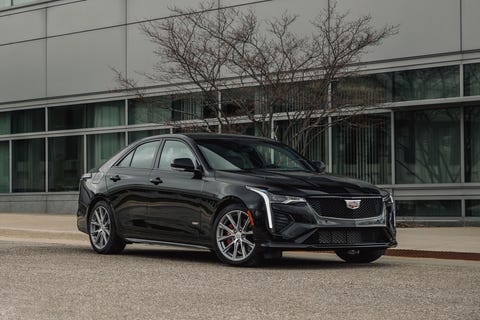View Photos

Michael SimariCar and Driver
The decades following your centennial are an unusual time for teenage self-discovery, but that’s exactly where Cadillac finds itself. Multiple reinventions in recent years and regular product reengineerings have brought about dramatic model repositioning as well. The CTS went from being a tweener betwixt established luxury segments as defined by the BMW 3- and 5-series and Mercedes C- and E-classes to being a direct competitor to the 5 and E and then back to being a tweener and now called the CT5. (Follow that?) And the brand’s headquarters moved from Detroit to New York City and back.
The ATS’s transition into the CT4 has been less dramatic, with the vehicle retaining even its wheelbase, but Cadillac’s reinvention of the V label worn by this example is perhaps the most jarring of all. Where the ATS-V packed a 464-hp twin-turbo V-6, the CT4-V has a four-cylinder. Yes, it’s turbocharged and, at 2.7 liters, it’s a beefy four. But 325 horsepower is a sad drop from 464.
It hurts less if you think of the CT4-V (and its CT5-V stablemate) as a V-lite. Which is no bad thing, as the CT4-V accomplishes the miraculous feat of making an ATS-V feel oversprung. This car is vastly more compliant and friendly, engaging and playful without making you regret it two hours into the drive. The steering is quick and nicely weighted, and the firm, progressive brake pedal is among the best you’ll find this side of $100,000. GM’s chassis-development team is one of the underappreciated success stories of the last decade, its primary benefactors being Cadillacs, the Corvette, the Camaro, and—oddly enough—GM’s pickups.
Speaking of pickups, Chevy’s Silverado donated its engine to the CT4-V. Once upon a time, that would have meant an iron-block 454 doing unthinkable things to the CT4-V’s claim of 50/50 weight distribution—and probably would have necessitated box flares on the front fenders. But in 2020, it means an inline-four with an aluminum block and head and a trick turbo. This engine joins the Bentley Mulsanne’s 6.8-liter in the growing club of gas engines with nominally higher peak torque than horsepower.
With a 380-lb-ft peak between 2000 and 4000 rpm and a redline at 6000, the 2.7 feels good and strong, and smooth at part throttle. At higher speeds and in higher gears—there are a lot of those with a 10-speed auto—the engine’s flattening output above 5000 rpm becomes more apparent. In those gears, you find yourself manually short-shifting to keep things moving. It’s easy to be caught off guard by a strip of collapsed pavement over a culvert or when approaching a railroad crossing a bit faster than intended, especially on the sort of bumpy two-lanes you find around central Michigan farmlands. There, an avenue is sometimes—surprise!—dirt, and the CT4-V’s more compliant suspension masks greater speeds.
The trans calibration seems a little off in Tour mode, displaying inconsistent shift behaviors such as revs that sometimes climb mid-shift and other times don’t. But in Sport, gearchanges happen so fast that there’s no time for them to be slurred. The way the Caddy automatically engages the aggressive shift map in the right kind of driving and the wide-open-throttle shifts in this mode are pleasant reminders that this Hydra-Matic 10-speed is related to the one offered in the Camaro ZL1 track marauder.
The CT4’s downsides have nothing to do with it being a V or not. The cramped interior carries over from the ATS, and while we love the deep maroon of the $1000 Sangria interior, that it’s just on the seats, console, and a few bits of trim makes it feel like an afterthought, rather than the better realized (and more spacious) interiors of competitors like the BMW 3-series, Genesis G70, and Volvo S60.
But even as an unofficial V-lite, the CT4-V delivers driving pleasure that few others in the class do. And don’t get too down on the power; Cadillac will rectify that with a new model above this one, likely powered by a version of the same twin-turbo six its predecessor had. We’re not yet sold on the name change—somehow, “CT4” sounds even less alluring than “ATS”—but it’s looking as if the recasting of V is going to be just fine.
Source: Reviews - aranddriver.com








